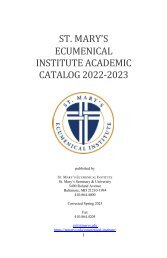EI Student Handbook 2022-2023
This Student Handbook supplements the current academic policies and procedures, which are published on our website. It also provides practical guidance for study and life within St. Mary’s Ecumenical Institute. We hope it serves as a tool of both communication and community.
This Student Handbook supplements the current academic policies and procedures, which are published on our website. It also provides practical guidance for study and life within St. Mary’s Ecumenical Institute. We hope it serves as a tool of both communication and community.
Create successful ePaper yourself
Turn your PDF publications into a flip-book with our unique Google optimized e-Paper software.
case is necessary to ensure campus safety, the<br />
Seminary reserves the right to pursue the matter.<br />
4. The Vice Rector or Associate <strong>EI</strong> Dean will also<br />
inform the alleged victim of the availability of<br />
protective measures, such as no contact orders and<br />
changes to class schedules or living arrangements, if<br />
such alternatives are available and feasible. The<br />
Vice Rector of Associate <strong>EI</strong> Dean will also provide<br />
the alleged victim with a written explanation of the<br />
alleged victim’s rights and options under this policy.<br />
5. The Seminary will not impose a campus conduct<br />
action for a violation of any alcohol or drug use<br />
policies of the Seminary for a student who reports an<br />
incident of sexual misconduct or who participates in<br />
an investigation of sexual misconduct as a witness if<br />
the violation occurred during or near the time of the<br />
alleged sexual misconduct; the student is determined<br />
to have made the report or participated in the<br />
investigation in good faith; and the violation was not<br />
an act that was reasonably likely to place the health<br />
or safety of another individual at risk.<br />
6. In response to a report of sexual misconduct, the<br />
Vice Rector or Associate <strong>EI</strong> Dean will normally<br />
convene a sexual misconduct hearing panel, which<br />
will be comprised of three faculty members and the<br />
Vice Rector or Associate <strong>EI</strong> Dean. Panel members<br />
will be selected by the President-Rector in<br />
consultation with the Vice Rector or Associate <strong>EI</strong><br />
Dean. The Vice Rector or Associate <strong>EI</strong> Dean and<br />
any members of the hearing panel receive training<br />
on issues related to dating violence, domestic<br />
violence, sexual assault, and stalking, and on how to<br />
conduct an investigation and hearing process that is<br />
fair, protects the safety of victims and the campus,<br />
and promotes accountability. No person with a<br />
conflict of interest may serve on the panel.<br />
7. Both the alleged victim and the alleged<br />
perpetrator will be invited to present their testimony<br />
to the hearing panel. Both parties will have an equal<br />
opportunity to request that the hearing panel call<br />
relevant witnesses and to provide any other relevant<br />
evidence and information. Cross-examination is<br />
prohibited, although the parties may submit<br />
questions to the hearing panel to ask witnesses on<br />
their behalf. Any evidence supplied by a party or<br />
upon which the panel may rely will be made<br />
available to both parties. Both parties have the right<br />
to be accompanied to the hearing and any related<br />
meeting by the advisor of their choice. The<br />
advisor’s role is to provide private advice and<br />
support to a party, and the advisor may not<br />
participate in the hearing or address the panel or any<br />
witnesses. The panel’s proceedings will be<br />
documented.<br />
8. The alleged victim and alleged perpetrator have<br />
the right to remain present during the panel’s entire<br />
hearing, but neither may be present during the<br />
panel’s deliberations, which are private.<br />
9. The alleged victim may choose to present his or<br />
her testimony to the panel without the alleged<br />
perpetrator being present. In the situation where a<br />
victim chooses not to present testimony in the<br />
presence of the alleged perpetrator, the testimony<br />
presented to the panel will be recorded and replayed<br />
for the alleged perpetrator to hear.<br />
10. Statements or questions regarding the past sexual<br />
history of the victim will generally not be<br />
permissible as evidence during the hearing except as<br />
they relate to the past sexual history of the alleged<br />
perpetrator with the alleged victim.<br />
11. In any case in which the alleged perpetrator<br />
claims that the victim consented, the burden of proof<br />
is on the alleged perpetrator to establish consent.<br />
12. The degree of impairment of the alleged victim’s<br />
ability to give or withhold consent may be<br />
introduced into evidence.<br />
13. Under Title IX, the panel must use a<br />
“preponderance of evidence” standard (i.e., whether<br />
it is more likely than not that sexual misconduct has<br />
occurred). If the panel determines that the alleged<br />
perpetrator violated the Sexual Misconduct Policy,<br />
the panel will decide the appropriate sanctions,<br />
which may include any of the penalties related to a<br />
violation of community standards listed below.<br />
14. Both parties will be notified of the outcome of<br />
the hearing in writing, simultaneously. This<br />
normally will be within five (5) working days of the<br />
35







